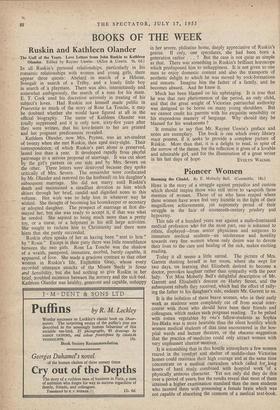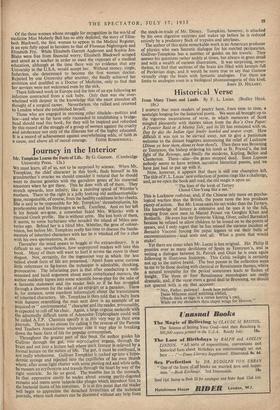Pioneer Women
Storming the Citadel. By E. Moberly Bell. (Constable. 18s.)
HERE is the story of a struggle against prejudice and custom which should inspire those who still strive to vanquish these enemies of women. Those of us who have reaped where these women have sown feel very humble in the light of their magnificent achievements, yet supremely proud of their struggle in the face of nineteenth-century prudery and hypocrisy.
This tale of a hundred years war against a male-dominated medical profession who for the most part, one is ashamed to relate, displayed—from senior physicians and surgeons to immature medical students—an intolerance and hostility towards very fine women whose only desire was to devote their lives to the care and healing of the sick, makes exciting reading.
Today it all seems a little unreal. The picture of Mrs. Garrett shutting herself in her room, where she wept for two days, on learning that Elizabeth desired to become a doctor, provokes laughter rather than sympathy with the poor lady. Yet Miss Moberly Bell's delightful description of Mr. Garrett and Elizabeth's descent on Harley Street, and the subsequent rebuffs they received, which had the effect of rally- ing the father to his daughter's side, endears Mr. Garrett to us.
It is the isolation of these brave women, who in their early work as students were completely cut off from social inter- course with those who should have been their friends and colleagues, which makes such poignant reading. To be pelted with rotten vegetables by one's fellow-students as Sophia Jex-Blake was is more bearable than the silent hostility which women medical students of that time encountered in the hos- pital wards and lecture theatres, or the obscene suggestion that the practice of medicine could only attract women with very unpleasant ulterior motives.
It is astonishing that in this hostile atmosphere a few women reared in the comfort and shelter of middle-class Victorian homes could maintain their high courage and at the same time concentrate on a medical curriculum which called for r long hours of hard study combined with hospital work of a physically arduous character. Yet not only did they do this over a period of years, but the results reveal that most of them attained a higher examination standard than the men students who taunted them with possessing a female brain which was not capable of absorbing the contents of a medical text-book. Of the three women whose struggle for recognition in the world of medicine Miss Moberly Bell has so ably depicted, the story of Eliza- beth Blackwell, the first woman to appeal in the Medical Register, is an epic fully equal in heroism to that of Florence Nightingale and Elizabeth Fry. While Elizabeth Garrett Anderson and Sophia Jex- Blake were free from financial worry, Elizabeth Blackwell scraped and saved as a teacher in order to meet the expenses of a medical education, although at the time there was no evidence that any University in the U.S.A. would accept her. Without money, single, fatherless, she determined to become the first woman doctor. Rejected by one University after another, she finally achieved her ambition and qualified as a Doctor of Medicine, only to find that her services were not welcomed even by the sick.
There followed work in Europe and the loss of an eye following an infection contracted from a sick baby. Only then was she over- whelmed with despair in the knowledge that she must abandon all thought of a surgical career. Nevertheless, she rallied and returned to London where she established herself.
Those who are engaged in storming other citadels—politics and law—and who so far have only succeeded in establishing a bridge- head should read this book, for they will be inspired and refreshed by this record of the struggle of a group of women against the cruelty and intolerance not only of the illiterate but of the highly educated. It is a record of achievement against overwhelming odds, of faith in a cause, and above all of moral courage. EDITH SUMMERSKILL.



























 Previous page
Previous page